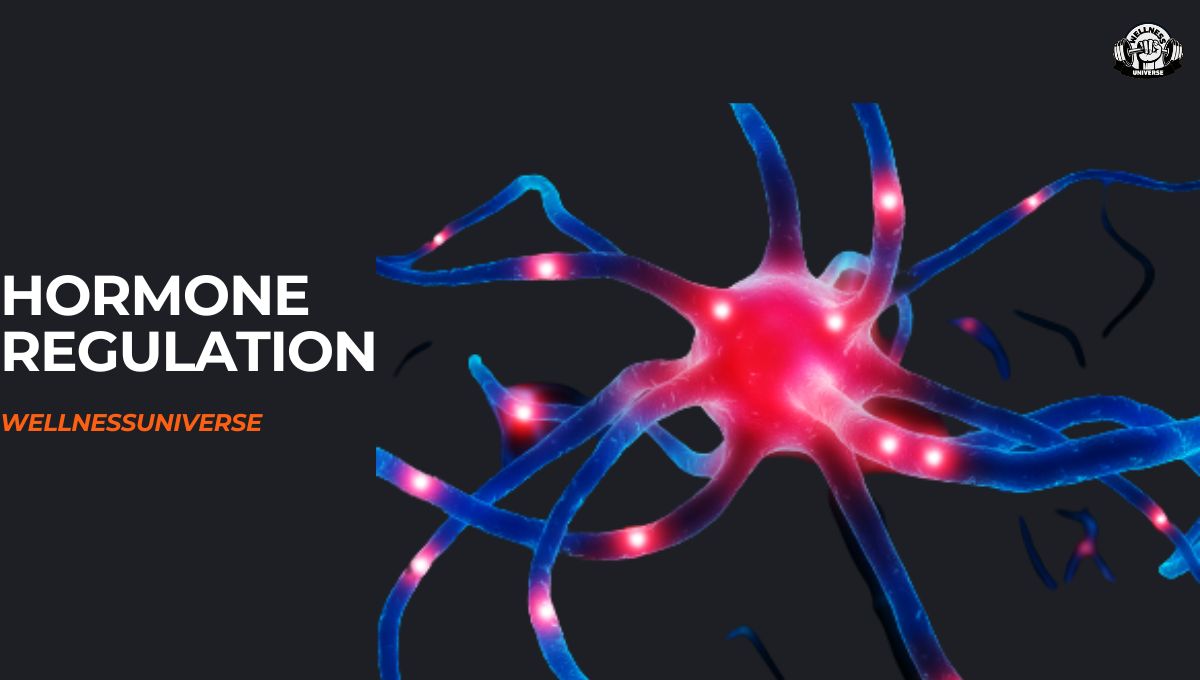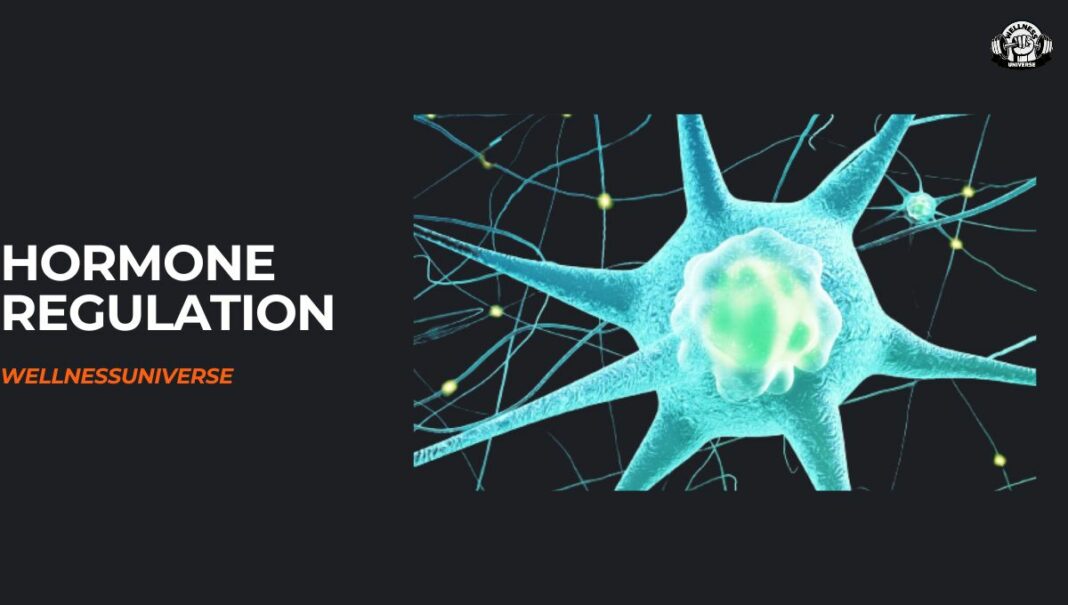Welcome to the fascinating world of hormone regulation, a complex and intricate system that plays a vital role in maintaining balance and optimal health within our bodies. Hormones are powerful chemical messengers produced by the endocrine glands, and they act as the body’s signaling agents, orchestrating various physiological processes. From metabolism and growth to reproduction and mood regulation, hormones influence almost every aspect of our well-being.
The significance of hormone regulation lies in its ability to ensure that these chemical messengers are maintained at the right levels, creating a harmonious symphony within our bodies. When hormones are balanced, they contribute to our overall vitality, mental clarity, emotional stability, and physical resilience. On the other hand, when hormone levels become disrupted, it can lead to a wide array of health issues and imbalances.
Hormone regulation is a delicate dance that involves constant communication between the endocrine system and various organs. The endocrine system comprises a network of glands, including the pituitary gland, thyroid gland, adrenal glands, pancreas, and others, each responsible for producing specific hormones. These hormones are then released into the bloodstream, traveling to target organs and tissues where they exert their effects.
The interaction of hormones is carefully orchestrated, with negative and positive feedback loops ensuring that the levels of various hormones remain within a narrow range. This dynamic equilibrium is essential for our body’s homeostasis, a state of balance where our physiological processes function optimally. Hormones regulate processes such as metabolism, blood sugar levels, immune response, sleep-wake cycles, and much more.
In this comprehensive blog, we will embark on a journey of exploration into the captivating realm of hormone regulation. Our aim is to demystify the intricacies of how hormones function, maintain balance, and impact our overall well-being. Throughout this journey, we will delve into various aspects of hormone regulation, providing you with valuable insights and actionable knowledge.
Our blog will cover essential topics, including the endocrine system’s role in hormone production and communication, the major hormones and their specific functions, and the effects of hormonal imbalances on different bodily systems. We will also discuss the factors that can disrupt hormone balance, lifestyle practices that promote hormonal harmony, and natural ways to support hormone regulation.
Moreover, we will explore the profound connections between stress, sleep, and hormone regulation, shedding light on how these factors influence our hormonal health. Additionally, we will discuss the impact of hormonal changes during significant life stages, such as puberty, pregnancy, and menopause.
Addressing the significance of hormone replacement therapy (HRT) and its role in balancing hormones will also be part of our exploration. Furthermore, we will delve into how hormones influence metabolism, weight regulation, reproductive health, and fertility.
The blog will also illuminate the intricate relationship between hormonal imbalances and mental health, including mood disorders and emotional well-being. We will take a closer look at medical conditions related to hormone regulation and the diagnostic and therapeutic approaches used in their treatment.
By the end of this journey, we hope you will gain a deeper understanding of hormone regulation and its profound impact on your health and vitality. Armed with knowledge and insights, you will be empowered to make informed choices that support your hormonal well-being and lead you towards a life of balance, resilience, and vibrant health. So, let’s embark on this enlightening adventure together and discover the wonders of hormone regulation.
The Marvels of Hormone Regulation

Hormone regulation is a remarkable biological process that ensures our bodies maintain a delicate balance of various hormones to support optimal functioning. Hormones are chemical messengers produced by specialized glands in the endocrine system, and they travel through the bloodstream to communicate with target cells and organs throughout the body. These messengers play a pivotal role in coordinating numerous physiological processes, acting as the conductors of a grand symphony within our bodies.
The importance of hormone regulation cannot be overstated, as it influences every aspect of our health and well-being. From metabolism and growth to reproduction and mood, hormones are the orchestrators of our bodily functions. They work in harmony to regulate body temperature, blood pressure, blood sugar levels, immune responses, and much more. A delicate balance of hormones ensures that these processes function optimally and maintain a state of homeostasis, where our internal environment remains stable despite external changes.
Hormone regulation is a dynamic process that involves constant feedback loops between the endocrine system and various organs. When hormone levels rise or fall, this triggers feedback mechanisms to either increase or decrease hormone production, thus maintaining equilibrium. Any disruption in this intricate dance can lead to hormonal imbalances, which can manifest as a range of health issues.
Within the realm of hormone regulation, hormones work together like a precisely choreographed dance troupe. Each hormone has a specific function and target tissues or organs where it exerts its effects. For example, insulin, produced by the pancreas, regulates glucose metabolism, while thyroid hormones, produced by the thyroid gland, control metabolism and energy levels.
Hormones can have either excitatory or inhibitory effects, meaning they can stimulate or inhibit specific physiological processes. Their interactions are carefully regulated through feedback loops involving the hypothalamus and pituitary gland, known as the “master glands” that control hormone production. For instance, when blood sugar levels rise, the pancreas releases insulin to lower blood sugar, and as blood sugar levels decrease, insulin production slows down.
The hypothalamus and pituitary gland continuously monitor hormone levels and orchestrate the release of hormones as needed to maintain a state of balance. This intricate dance ensures that hormones are present in the right amounts at the right times, working synergistically to keep our bodies functioning optimally.
The world of hormones is vast, with various hormones performing diverse roles in regulating bodily functions. Some of the major hormones include:
- Insulin: Regulates blood sugar levels by facilitating the uptake of glucose into cells for energy or storage in the liver and muscles.
- Thyroid Hormones (T3 and T4): Control metabolism, energy production, and body temperature.
- Cortisol: Influences metabolism, immune responses, and the body’s stress response.
- Estrogen and Progesterone: Key hormones in the female reproductive system, regulating the menstrual cycle and supporting pregnancy.
- Testosterone: Primarily found in males, plays a role in muscle mass, bone density, and reproductive health.
- Growth Hormone: Supports growth, cell regeneration, and overall body repair.
- Melatonin: Regulates the sleep-wake cycle and promotes restful sleep.
- Adrenaline (Epinephrine) and Noradrenaline (Norepinephrine): Involved in the body’s “fight or flight” response to stress.
Understanding the roles of these major hormones is crucial for comprehending how hormone regulation impacts our health. Each hormone operates as a key player in a complex orchestra, with their harmonious coordination contributing to the symphony of life within us.
As we unravel the wonders of hormone regulation, we gain insight into the delicate balance that sustains our well-being. The intricate dance of hormones orchestrates the symphony of life, and through this profound understanding, we can appreciate the marvels of our body’s hormone regulation system. In the subsequent sections, we will delve deeper into the mechanics of hormonal balance and its effects on our physical, emotional, and mental health.
The Endocrine System: Mastering the Art of Hormone Regulation
The endocrine system, often referred to as the body’s messaging system, is a complex network of glands and tissues responsible for producing and releasing hormones into the bloodstream. These hormones act as chemical messengers, traveling to distant target organs and cells, where they initiate specific biological responses. Through this intricate symphony of hormones, the endocrine system plays a crucial role in regulating various bodily functions and maintaining overall balance and homeostasis.
The endocrine system works in close partnership with the nervous system, with both systems collaborating to control and coordinate the body’s activities. While the nervous system uses electrical signals to transmit information rapidly, the endocrine system employs hormones to communicate more slowly but with a longer-lasting impact. This seamless integration of the endocrine and nervous systems ensures that our bodies respond appropriately to internal and external stimuli, maintaining equilibrium even in the face of changes in the environment or physiological demands.
The endocrine system comprises several glands, each specializing in the production of specific hormones. These glands include the pituitary gland, thyroid gland, adrenal glands, pancreas, ovaries (in females), and testes (in males), among others. Each gland plays a unique role in the endocrine symphony, contributing to the overall harmonious functioning of the body.
The endocrine system operates through an intricate process of hormone production, release, and communication. The glands of the endocrine system act as conductors, carefully orchestrating the release of hormones to ensure they reach their intended destinations and trigger appropriate responses.
Hormones are synthesized within specific endocrine glands in response to various stimuli. For instance, the hypothalamus, a region in the brain, acts as a master regulator, sensing changes in the body’s internal environment and sending signals to the pituitary gland, often referred to as the “master gland.” The pituitary gland then releases specific hormones that act on other endocrine glands, stimulating or inhibiting their hormone production.
Once produced, hormones are released into the bloodstream, which acts as a vast communication network. As hormones travel throughout the body, they encounter target cells or organs equipped with receptors specifically designed to recognize and respond to each hormone’s unique chemical structure. The interaction between hormones and their receptors initiates cellular responses, regulating various physiological processes.
Hormone regulation involves a series of delicate feedback loops, where the body monitors hormone levels and adjusts hormone production accordingly. These feedback mechanisms ensure that hormone levels remain within a narrow range, promoting equilibrium and preventing excessive fluctuations.
Negative feedback loops are the most common regulatory mechanism in the endocrine system. When hormone levels rise above the desired threshold, the body’s cells or organs send signals to the brain, particularly the hypothalamus and pituitary gland, to reduce hormone production. Conversely, if hormone levels drop below the desired range, the body initiates signals to increase hormone secretion.
This intricate feedback system maintains hormonal balance and prevents hormone-related disorders. For example, in the regulation of blood glucose levels, when blood sugar rises after a meal, the pancreas releases insulin, which signals cells to uptake glucose for energy. As blood sugar decreases, the production of insulin diminishes.
The endocrine system’s ability to masterfully execute hormone regulation through feedback loops is essential for maintaining health and well-being. Any disruption in these feedback mechanisms can lead to hormonal imbalances, impacting various bodily functions and potentially causing a range of health issues.
Understanding the intricacies of the endocrine system provides us with insight into the orchestra of hormones that govern our bodies. In the subsequent sections, we will continue our exploration into the fascinating world of hormone regulation, unveiling the roles of major hormones and their specific functions in regulating bodily processes. Together, let us delve deeper into this symphony of hormones and the endocrine system’s artful mastery of hormone regulation.
Hormonal Imbalances: Causes, Symptoms, and Health Implications
Hormone balance is a delicate state crucial for our well-being, but various factors can disrupt this harmony, leading to hormonal imbalances. Some common culprits include lifestyle choices, medical conditions, age-related changes, and environmental exposures. Poor dietary habits, sedentary lifestyles, chronic stress, inadequate sleep, and excessive use of certain medications can all contribute to hormonal disruptions.
Endocrine disorders, such as thyroid disorders, polycystic ovary syndrome (PCOS), and diabetes, can also cause imbalances in specific hormones. Additionally, certain medical treatments, such as radiation or chemotherapy, may impact hormone production and release.
As we age, hormonal fluctuations become more prevalent, particularly during puberty, pregnancy, and menopause. Environmental exposures to endocrine-disrupting chemicals found in plastics, pesticides, and personal care products can interfere with hormone production and function.
Hormonal imbalances can manifest in a wide range of symptoms, which can vary depending on the specific hormones affected and the degree of disruption. Some common symptoms of hormonal imbalances include:
- Unexplained weight changes
- Fatigue and low energy levels
- Irregular menstrual cycles or changes in menstrual flow
- Mood swings and emotional instability
- Skin issues, such as acne or dryness
- Changes in libido and sexual function
- Hair loss or excessive hair growth (in females)
- Sleep disturbances and insomnia
- Digestive problems, such as bloating or constipation
- Changes in appetite and food cravings
- Temperature sensitivity and feeling too hot or too cold
- Decreased bone density (in postmenopausal women)
- Reduced muscle mass and strength
- Difficulty concentrating and memory problems
It is essential to note that these symptoms can result from various factors, and hormonal imbalances are not always the primary cause. However, persistent or worsening symptoms warrant investigation, and seeking medical advice is crucial for proper evaluation and diagnosis.
Hormonal imbalances can significantly impact both physical and mental well-being. For instance, imbalances in thyroid hormones can lead to weight fluctuations, fatigue, and changes in mood. Hormonal disruptions related to the reproductive system can cause irregular menstrual cycles, fertility challenges, and emotional upheavals.
For women experiencing menopause, declining estrogen levels can result in hot flashes, night sweats, and decreased bone density. In men, declining testosterone levels with age may lead to reduced muscle mass, decreased libido, and mood changes.
Hormonal imbalances can also influence mental health, contributing to mood disorders, anxiety, and depression. Fluctuating hormones, such as cortisol during times of chronic stress, can affect the body’s stress response and impact emotional well-being.
Furthermore, hormonal imbalances may have long-term implications for metabolic health, cardiovascular health, bone health, and immune function. Addressing and managing hormonal imbalances are crucial steps in supporting overall health and preventing potential complications.
Navigating the complexities of hormonal imbalances requires a thorough evaluation by healthcare professionals. Diagnostic tests, such as blood tests and hormone level assessments, can provide valuable insights into hormonal status. Treatments for hormonal imbalances may include lifestyle modifications, hormone replacement therapy (HRT), or other targeted interventions, depending on the specific hormonal issues identified.
In the subsequent sections, we will delve deeper into lifestyle factors that influence hormonal balance and explore natural approaches to support hormone regulation. By understanding the causes, symptoms, and health implications of hormonal imbalances, we can take proactive steps towards maintaining hormonal harmony and promoting overall well-being.
Empowering Balance: Lifestyle Factors and Hormone Regulation
Diet plays a significant role in hormone regulation, as the foods we consume directly impact hormone production, secretion, and function. A balanced and nourishing diet provides the essential nutrients that support hormonal harmony. Healthy fats, such as omega-3 fatty acids found in fatty fish, avocados, and nuts, are crucial for hormone production and cell membrane integrity.
Consuming an adequate amount of protein is essential, as amino acids from proteins are building blocks for hormones. Additionally, including a variety of fruits, vegetables, and whole grains provides essential vitamins, minerals, and antioxidants that help maintain a healthy endocrine system.
Avoiding highly processed foods, refined sugars, and trans fats is crucial, as they can contribute to insulin resistance and disrupt hormonal balance. High sugar consumption may lead to fluctuations in blood sugar levels, affecting insulin and cortisol production, which can influence appetite and energy levels.
Regular physical activity is a potent tool for promoting hormone regulation and overall well-being. Exercise can help reduce stress and improve mood by stimulating the release of endorphins, the body’s natural “feel-good” chemicals. It also supports hormonal balance by enhancing insulin sensitivity, which can aid in blood sugar regulation.
Certain types of exercise, such as resistance training, can promote the production of growth hormone, which plays a crucial role in muscle repair and regeneration. Additionally, engaging in regular exercise can support healthy thyroid function, metabolism, and reproductive hormones.
However, it is essential to strike a balance, as excessive or intense exercise without adequate rest can lead to increased cortisol levels and hormonal imbalances. Finding a sustainable and enjoyable exercise routine that aligns with individual needs is key to reaping the hormonal benefits of physical activity.
Stress is a significant factor that can disrupt hormone regulation and lead to imbalances. When the body perceives stress, it triggers the release of cortisol, often referred to as the “stress hormone.” While cortisol is essential for the body’s stress response, chronic stress can result in elevated cortisol levels, which may lead to imbalances in other hormones.
Engaging in stress-reducing practices, such as mindfulness meditation, deep breathing exercises, yoga, or spending time in nature, can help modulate cortisol levels and promote hormonal balance. Prioritizing time for relaxation and self-care is essential for managing stress and supporting overall well-being.
Adequate sleep is another critical factor in maintaining hormonal harmony. During sleep, the body undergoes essential processes of repair, restoration, and hormone regulation. Disrupted sleep patterns or chronic sleep deprivation can negatively impact hormone levels, particularly those related to appetite regulation, energy balance, and stress response.
Implementing good sleep hygiene practices, such as maintaining a consistent sleep schedule, creating a conducive sleep environment, and limiting exposure to electronic devices before bedtime, can significantly improve sleep quality and hormone regulation.
Taking a holistic approach to hormone regulation involves nurturing the mind, body, and spirit. By adopting a balanced diet, engaging in regular physical activity, managing stress, and prioritizing restful sleep, individuals can empower their bodies to maintain hormonal harmony and overall well-being.
In the following sections, we will explore natural approaches to support hormone balance further, including the role of specific nutrients and herbal remedies. By understanding the interplay between lifestyle factors and hormone regulation, we can embark on a journey of empowerment and optimize our hormonal health for a vibrant and balanced life.
Emotional Health: The Mind-Hormone Connection
Hormones and emotions share a deep and intricate connection within our bodies. While emotions are complex psychological responses to various stimuli, hormones significantly influence their expression and intensity. Hormones act as messengers, and specific hormones can affect our mood, stress levels, and overall emotional well-being.
For instance, serotonin, often referred to as the “happy hormone,” plays a crucial role in regulating mood, promoting feelings of happiness and well-being. On the other hand, cortisol, the “stress hormone,” is associated with the body’s stress response and can influence feelings of anxiety and tension.
Estrogen and progesterone, primarily known for their roles in the female reproductive system, also influence emotional health. Fluctuations in these hormones during the menstrual cycle can lead to mood swings and emotional changes.
Hormonal imbalances can significantly impact mental health and emotional well-being. Imbalances in hormones such as serotonin, dopamine, and norepinephrine can contribute to mood disorders such as depression and anxiety. Low levels of serotonin, in particular, have been linked to feelings of sadness and depression.
Additionally, hormonal imbalances related to the thyroid gland can affect cognitive function, leading to difficulties with memory, concentration, and mental clarity. Conditions such as hypothyroidism, characterized by low thyroid hormone levels, are associated with symptoms of depression, fatigue, and cognitive fog.
Hormonal imbalances can also exacerbate pre-existing mental health conditions, making it essential to address both physical and emotional aspects in treatment and support.
Nurturing mental wellness is integral to maintaining hormonal harmony and overall health. A holistic approach to emotional well-being involves addressing the interplay between mind and body and adopting strategies to support both.
Engaging in stress-reduction techniques, such as mindfulness meditation, yoga, or progressive muscle relaxation, can help modulate cortisol levels and promote emotional balance. These practices encourage a sense of calm and improve resilience to stressors.
Prioritizing self-care and setting aside time for activities that bring joy and fulfillment can positively impact emotional health. Connecting with nature, spending time with loved ones, and engaging in hobbies and creative pursuits can all contribute to emotional well-being.
Seeking professional support from mental health practitioners, such as therapists or counselors, can be beneficial for individuals experiencing emotional challenges related to hormonal imbalances or other stressors. Therapy can provide valuable tools to cope with emotions, navigate life transitions, and promote personal growth.
Additionally, maintaining a balanced lifestyle that includes regular exercise, a nourishing diet, and sufficient sleep can create a solid foundation for emotional well-being and hormonal regulation.
By recognizing the intricate connection between hormones and emotions, individuals can take proactive steps to support their emotional health. Embracing a holistic approach that integrates mental wellness and hormone regulation empowers individuals to achieve emotional balance and cultivate resilience, contributing to a fulfilling and emotionally rich life.
In the following sections, we will explore natural remedies and therapeutic approaches to support emotional well-being and harmonious hormone regulation. Together, let us delve deeper into the mind-hormone connection and discover ways to nurture emotional health for a more vibrant and fulfilling life.
In Crux
Hormone regulation is a fundamental pillar of overall health and well-being. The intricate symphony of hormones within our bodies orchestrates numerous physiological processes, influencing everything from metabolism and reproductive health to mood and energy levels. Understanding the importance of hormone regulation empowers us to take charge of our health and make informed choices to support optimal hormonal balance.
Hormones play a multifaceted role in maintaining harmony within our bodies. From the thyroid hormones that govern metabolism to the sex hormones that regulate reproductive health, each hormone contributes to the complex tapestry of our well-being. By appreciating the profound impact of hormones on our physical, mental, and emotional health, we can develop a deeper connection with our bodies and cultivate a greater sense of self-awareness.
As we navigate the intricate realm of hormone regulation, we are presented with the opportunity to make empowered choices that promote lifelong well-being. Through lifestyle modifications, such as adopting a balanced diet, engaging in regular physical activity, managing stress, and prioritizing restful sleep, we can lay a solid foundation for hormonal harmony.
Paying attention to the signals our bodies provide and recognizing the importance of self-care are essential components of nurturing hormone balance. Listening to our bodies’ unique needs and responding with compassion and kindness allows us to cultivate a harmonious relationship with our hormones.
Additionally, seeking support from healthcare professionals and mental health practitioners can be invaluable on our journey toward optimal hormone regulation. These experts can provide personalized guidance, diagnostics, and treatment options to address specific hormonal imbalances or health concerns.
The exploration of hormone regulation is an ongoing journey, and each individual’s path is unique. As we embrace the significance of hormonal balance, we embark on a continuous quest to nurture our bodies and minds for vitality and well-being.
Let this journey be a celebration of self-discovery and growth. Embrace the changes and transformations that come with understanding your hormonal health. Embrace your body’s resilience and capacity to adapt, as it seeks equilibrium even in the face of challenges.
Remember that hormone regulation is not about perfection but progress. Small steps toward positive lifestyle changes can have a profound impact on hormonal balance and overall health. Be patient and compassionate with yourself, acknowledging that each day offers a fresh opportunity to make choices that honor your well-being.
Share your knowledge and experiences with others, as supporting one another in this journey can foster a sense of community and empowerment. By spreading awareness of hormone regulation and its importance, we contribute to a world where well-being and vitality are prioritized.
As we conclude this exploration into hormone regulation, may we carry the wisdom gained and the commitment to honor our bodies’ needs. Embrace the power of hormones in shaping our lives, and let us embark on a path of optimal hormone regulation, embracing vitality, and nurturing well-being for a fulfilling and harmonious life.
Thank you for joining us on this fitness journey! We hope you found our Mastering the Dance of Hormones: Your Guide to Regulation? blog insightful and inspiring. Our aim is to provide you with valuable information, expert advice, and motivational content to support you in your wellness endeavors.
Related Post :-
- How To Do Wall Pushups
- Hand Size Demystified
- CrossFit Unleashed
- Barbell Lunges
- Forearm Fortitude
- Kettlebell Circuit
- Power of Personal Trainers
- Down Pull-Ups
FAQs about Hormone Regulation
How do hormones function in the body, and how do they maintain balance?
Hormones function as messengers, traveling through the bloodstream and interacting with target cells or organs equipped with specific receptors. When a hormone binds to its receptor, it initiates a biological response within the target cells. This communication system enables hormones to regulate various bodily functions, such as controlling blood sugar levels, supporting bone density, and regulating the sleep-wake cycle. Hormonal balance is maintained through sophisticated feedback mechanisms, where the body monitors hormone levels and adjusts hormone production accordingly to prevent excessive fluctuations.
What are the major hormones, and what are their roles in regulating different bodily functions?
There are several major hormones in the body, each with its unique functions. For example, insulin is essential for regulating blood sugar levels, while thyroid hormones control metabolism and energy expenditure. Sex hormones, such as estrogen and testosterone, play a key role in reproductive health and sexual development. Additionally, cortisol is involved in the body's stress response, and growth hormone supports tissue repair and growth.
How does the endocrine system contribute to hormone regulation?
The endocrine system, comprised of various glands throughout the body, is responsible for hormone production and regulation. These glands, including the pituitary gland, thyroid gland, and adrenal glands, secrete hormones into the bloodstream, where they travel to target organs and cells. The hypothalamus in the brain acts as a master regulator, controlling the release of hormones from the pituitary gland, often referred to as the "master gland."
What factors can disrupt hormone balance and lead to hormonal imbalances?
Several factors can disrupt hormone balance, including poor dietary choices, chronic stress, inadequate sleep, certain medications, and environmental exposures to endocrine-disrupting chemicals. Medical conditions, such as thyroid disorders and polycystic ovary syndrome (PCOS), can also cause hormonal imbalances.
What are the symptoms and health implications of hormonal imbalances?
Symptoms of hormonal imbalances can vary widely, depending on the specific hormones affected and the degree of disruption. Common symptoms include weight changes, fatigue, mood swings, irregular menstrual cycles, skin issues, changes in libido, and sleep disturbances. Hormonal imbalances can impact reproductive health, metabolic function, mood, and overall well-being.
How can lifestyle factors, such as diet and exercise, influence hormone regulation?
Diet and exercise play a significant role in hormone regulation. A balanced diet rich in essential nutrients supports hormone production and function. Regular physical activity can help reduce stress, improve mood, and enhance insulin sensitivity. However, excessive exercise without adequate rest can lead to hormonal imbalances.
Are there natural ways to support hormone balance and regulation?
Yes, several natural approaches can support hormone balance. Consuming a balanced diet, engaging in regular exercise, practicing stress-reduction techniques, and prioritizing restful sleep are all beneficial for maintaining hormonal harmony. Herbal remedies and certain supplements may also offer support for specific hormone-related issues.
How do stress and sleep affect hormone regulation?
Chronic stress can lead to increased cortisol production, which may disrupt other hormones in the body. Managing stress through relaxation techniques can help maintain hormonal balance. Sleep is essential for hormone regulation, as the body undergoes vital processes during rest, such as hormone secretion and repair. Disrupted sleep patterns or sleep deprivation can negatively impact hormone levels and overall health.
Can hormone replacement therapy (HRT) be used for hormonal imbalances?
Hormone replacement therapy (HRT) may be used to address specific hormonal imbalances, such as menopausal symptoms or certain endocrine disorders. However, HRT is not suitable for everyone, and its use should be carefully evaluated by healthcare professionals to assess individual needs, risks, and benefits.

Meet Pradeep Singh, your go-to guide for all things fitness, health, and motivation. With over 7 years in the field, Pradeep brings a blend of expertise and real-world experience to his writing. From workout tips to healthy living insights, he simplifies complex topics, making fitness accessible for everyone. His authentic approach and genuine passion aim to inspire and support your wellness journey. Get ready to embark on a path to a healthier lifestyle with Pradeep as your trusted companion and motivator.






















